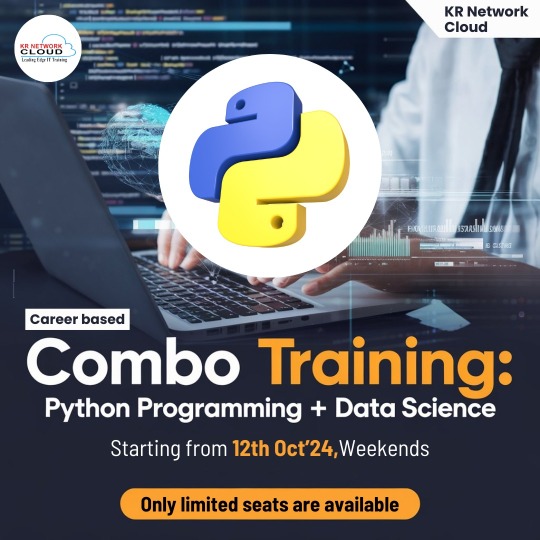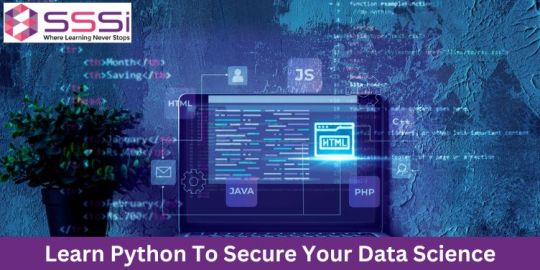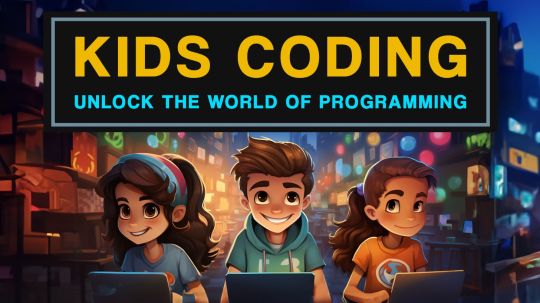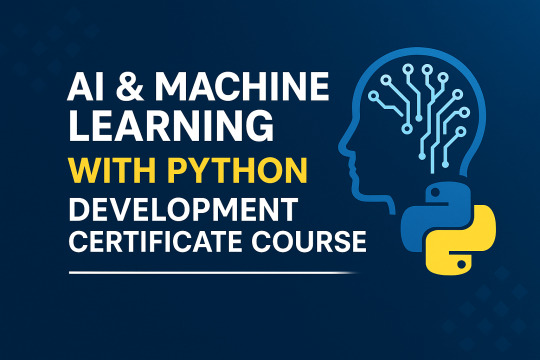#Learn python programming for beginners
Explore tagged Tumblr posts
Video
youtube
#youtube#Deep learning with pytorch - full course#Deep learning pytorch course#Pytorch full course for beginners#Learn python programming for beginners
0 notes
Text
Started a course I found for learning programming earlier and did you guys know. It's all math
#i was so caught up in the delight of learning computer program i forgot for a moment that computers were all math#dhdDNDJA#I'm gonna try though. the MIT open source whatever it is has a beginner's programming course using python 3 so 🤷♂️ why not
3 notes
·
View notes
Text
youtube
3 notes
·
View notes
Text
Unlock the Power of Python Programming: A Complete Guide
Python programming has become one of the most sought-after skills in the world of technology. Its simplicity, flexibility, and vast ecosystem of libraries make it a top choice for both beginners and experienced developers. In this guide, we will explore various aspects of Python programming, from basic concepts to advanced applications like machine learning and web development.
Python Programming: A Beginner-Friendly Language
Python programming is renowned for its readability and straightforward syntax, making it ideal for beginners. Whether you are just starting to code or transitioning from another language, Python offers a smooth learning curve. Key Python programming concepts include variables, data types, and control structures, which are essential for writing functional code.
youtube
Python Data Structures: Organizing Data Efficiently
One of the core strengths of Python programming is its rich set of data structures. Lists, dictionaries, tuples, and sets help you store and manage data effectively. Understanding Python data structures allows you to create more efficient programs by organizing and manipulating data effortlessly.
Functions in Python Programming: Building Reusable Code
Functions are a fundamental part of Python programming. They allow you to break down complex problems into smaller, reusable chunks of code. Python functions not only promote code reusability but also make your programs more organized and easier to maintain.
Loops in Python Programming: Automating Repeated Tasks
Loops are an essential feature in Python programming, allowing you to perform repeated operations efficiently. With Python loops such as for and while, you can iterate over sequences or perform tasks until a specific condition is met. Mastering loops is a key part of becoming proficient in Python.
Object-Oriented Programming in Python: Structured Development
Python programming supports object-oriented programming (OOP), a paradigm that helps you build structured and scalable software. OOP in Python allows you to work with classes and objects, making it easier to model real-world scenarios and design complex systems in a manageable way.
Python Automation Scripts: Simplify Everyday Tasks
Python programming can be used to automate repetitive tasks, saving you time and effort. Python automation scripts can help with file management, web scraping, and even interacting with APIs. With Python libraries like os and shutil, automation becomes a breeze.
Python Web Development: Creating Dynamic Websites
Python programming is also a popular choice for web development. Frameworks like Django and Flask make it easy to build robust, scalable web applications. Whether you're developing a personal blog or an enterprise-level platform, Python web development empowers you to create dynamic and responsive websites.
APIs and Python Programming: Connecting Services
Python programming allows seamless integration with external services through APIs. Using libraries like requests, you can easily interact with third-party services, retrieve data, or send requests. This makes Python an excellent choice for building applications that rely on external data or services.

Error Handling in Python Programming: Writing Resilient Code
Python programming ensures that your code can handle unexpected issues using error handling mechanisms. With try-except blocks, you can manage errors gracefully and prevent your programs from crashing. Error handling is a critical aspect of writing robust and reliable Python code.
Python for Machine Learning: Leading the AI Revolution
Python programming plays a pivotal role in machine learning, thanks to powerful libraries like scikit-learn, TensorFlow, and PyTorch. With Python, you can build predictive models, analyze data, and develop intelligent systems. Machine learning with Python opens doors to exciting opportunities in artificial intelligence and data-driven decision-making.
Python Data Science: Turning Data Into Insights
Python programming is widely used in data science for tasks such as data analysis, visualization, and statistical modeling. Libraries like pandas, NumPy, and Matplotlib provide Python programmers with powerful tools to manipulate data and extract meaningful insights. Python data science skills are highly in demand across industries.
Python Libraries Overview: Tools for Every Task
One of the greatest advantages of Python programming is its extensive library support. Whether you're working on web development, automation, data science, or machine learning, Python has a library for almost every need. Exploring Python libraries like BeautifulSoup, NumPy, and Flask can significantly boost your productivity.
Python GUI Development: Building User Interfaces
Python programming isn't just limited to back-end or web development. With tools like Tkinter and PyQt, Python programmers can develop graphical user interfaces (GUIs) for desktop applications. Python GUI development allows you to create user-friendly software with visual elements like buttons, text fields, and images.
Conclusion: Python Programming for Every Developer
Python programming is a versatile and powerful language that can be applied in various domains, from web development and automation to machine learning and data science. Its simplicity, combined with its extensive libraries, makes it a must-learn language for developers at all levels. Whether you're new to programming or looking to advance your skills, Python offers endless possibilities.
At KR Network Cloud, we provide expert-led training to help you master Python programming and unlock your potential. Start your Python programming journey today and take the first step toward a successful career in tech!
#krnetworkcloud#python#language#programming#linux#exams#coding#software engineering#coding for beginners#careers#course#training#learning#education#technology#computing#tech news#business#security#futurism#Youtube
2 notes
·
View notes
Text

Learn Python To Secure Your Future In Data Science
Python is one of the most important coding or programming languages that is used by more than 8 million programmers as their main programming language.Now let's talk about how to learn Python. Python language is the basic and the easiest language compared to any other language.
To more info Visit us :- https://www.sssi.in/blog/engineering/learn-python-to-secure-your-future
#learn python#online training python#python developers#python basics#learn python for data analysis#python programming#coding python for beginners
3 notes
·
View notes
Text
Unleash Your Child's Coding Potential with Kids Coding PRO!
We're excited to share that Kids Coding PRO has ignited a coding revolution among young minds. Our students have embarked on an incredible journey, where coding is no longer a mystery but a tool for boundless creativity. From developing fun games to crafting interactive websites.
To read more click here <<

🚀 Your Path to Coding Mastery:
Step 1: Dive into the World of Coding: Start your coding adventure with ease, even if you're a complete beginner.
Step 2: Explore the Magic of Programming: Discover the secrets behind creating games, apps, and websites.
Step 3: Hands-On Coding: Get ready to code like a pro with practical projects that bring your ideas to life.
To Get full course click here <<
🎮 Fun and Engaging Learning:
Say goodbye to boring coding classes! Kids Coding PRO makes learning fun and interactive. Learn by doing, with engaging projects and challenges that boost creativity.
💡 Ready-to-Use Coding Resources:
No need to start from scratch! We provide you with templates and ready-to-use code snippets. Customize and build your own projects, from games to websites, with confidence.Join us in the world of coding excellence with Kids Coding PRO. Unleash your child's potential and equip them with skills for a digital future!
Enroll Now and Unlock the World of Coding! Click here <<

#coding#hello world#how to unlock the selection in word#unlock all house miga world#free unlock all housr toca life world#how to access block site whole world#secret to unlock all house toca life world#how to learn coding#day in the life of a software engineer#how to learn coding for beginners#how to learn coding fast#toca life world free code#hello world program#unlock android#hello world kattis python#hello world kattis#hello world kattis solution#tumblr
2 notes
·
View notes
Text
How learning best python skill can transform your career in 2025

In 2025, tech skills are evolving faster than ever — and Python has become the top programming language powering the future of artificial intelligence and machine learning. Whether you're a beginner or looking to upskill, learning Python for AI and ML could be the career move that sets you apart in this competitive job market.
Key benefits of learning python for AI & ML in 2025
Future-Proof Skill
As automation and AI become integral to every industry, Python fluency gives you a competitive edge in an AI-first world.
Beginner-Friendly Yet Powerful
You don’t need a computer science degree to learn Python. It’s perfect for non-tech professionals transitioning into tech careers.
Freelance and Remote Opportunities
Python developers working in AI and ML are in high demand on platforms like Upwork and Toptal many command salaries above six figures, working remotely.
Community and Resources
With massive open-source support, free tutorials, and active forums, you can learn Python for AI even without formal education.
Create roadmap: python for Ai and Machine learning
Master the Basics Start with variables, data types, loops, functions, and object-oriented programming in Python.
Understand Data Science Foundations Learn to work with Pandas, NumPy, and Matplotlib for data preprocessing and visualization.
Dive into Machine Learning Explore supervised and unsupervised learning using Scikit-learn, then graduate to TensorFlow and PyTorch for deep learning.
Build Real Projects Hands-on experience is key. Start building real-world applications like:
Spam email classifier
Stock price predictor
Chatbot using NLP
Why python is the best language for AI & Machine learning
Python's simplicity, vast libraries, and flexibility make it the best programming language for artificial intelligence. With intuitive syntax and community support, it's a favorite among data scientists, developers, and AI engineers.
✅ High-demand Python libraries in AI:
TensorFlow and Keras – deep learning models
Scikit-learn – machine learning algorithms
Pandas & NumPy – data analysis and manipulation
Matplotlib & Seaborn – data visualization
These tools allow developers to build everything from predictive models to smart recommendation systems all using Python.
Career Opportunities After Learning Python for AI
If you're wondering how Python for AI and ML can shape your future, consider this: tech companies, startups, and even non-tech industries are hiring for roles like:
Machine Learning Engineer
AI Developer
Data Scientist
Python Automation Engineer
NLP (Natural Language Processing) Specialist
According to LinkedIn and Glassdoor, these roles are not just high-paying but are also projected to grow rapidly through 2030.
Best courses to learn python for Ai & ML in 2025
Google AI with Python (Free course on Coursera)
Python course With SKILL BABU
IBM Applied AI Certification
Udemy: Python for Machine Learning & Data Science
Fast.ai Deep Learning Courses (Free)
These programs offer certifications that can boost your resume and help you stand out to employers.
Conclusion: Choose Your Best Career with Python in 2025
If you’re looking to stay ahead in 2025’s job market, learning Python for AI and machine learning is more than a smart move , it’s a career game-changer. With endless growth opportunities, high-paying roles, and the chance to work on cutting-edge technology, Python opens doors to a future-proof tech career.
Start today. The future is written in Python.
#python#app development company#PythonForAI#MachineLearning2025#LearnPython#TechCareers#AIin2025#Python Programming#Learn AI in 2025#Machine Learning Career#Future Tech Skills#Python for Beginners
0 notes
Text
Python Programming Course with Certification – Live Online
Join Sunbeam’s Live Online Python Programming Course and kickstart your journey in coding, automation, data analysis, and AI. Guided by expert Mr. Nilesh Ghule, this course offers a structured curriculum, hands-on practice, and live Q&A. 📅 Start Date: 2nd June 2025 🕒 Timing: 7:00 PM – 9:00 PM (Mon to Fri) 💰 Fees: ₹8100 (Inclusive GST) 🎓 Certification + Project + Group Discount 🔗 Register now at www.sunbeaminfo.in 📞 Contact: 82 82 82 9806
✅ Bonus Group Offer:
👨👩👧👦 Team of Five, Time to Thrive! Get 20% OFF on learning when enrolling in a group of five!
✅ What You'll Learn:
Python basics to advanced topics
Data analysis using NumPy & Pandas
Visualization with Matplotlib
Web & functional programming
Image processing using OpenCV
Real-time projects and problem-solving
✅ Who Should Join:
College students, freshers, and job seekers
Working professionals aiming to upskill
Anyone with basic programming knowledge
#“Python online course”#“Learn Python in Pune”#“Python training with certification”#“Live Python classes”#“Python classes for beginners”#“Best Python course in India”#“Python for data analysis”#“Instructor-led Python training”#“Affordable Python course”#“Python programming course Pune”#“Python course with projects”#“Data science Python course”
0 notes
Text
Is Python Hard to Learn Without a Tech Background?
In today’s digital world, Python is everywhere, from powering AI models to automating repetitive tasks at work. But if you don’t have a technical background, you may wonder. Python is one of the most beginner-friendly programming languages available, and it’s an excellent choice even for non-tech learners. Let’s explore why.
Introduction: Why Python Appeals to Non-Tech Learners
Whether you’re in marketing, finance, teaching, or customer service, you’ve probably seen Python mentioned in job descriptions or professional development programs. There’s a good reason for that.
Python is known for:
Simple and readable syntax
Strong community support
Wide range of real-world uses
Growing demand in the job market

According to the TIOBE Index, Python is consistently ranked among the top three programming languages globally. More importantly, it’s being used far beyond traditional software development roles.
Let’s break down how Python can be learned without a technical background, and why now is the perfect time to get started.
Why Python Is Ideal for Beginners
1. Clean and Easy-to-Read Syntax
Python uses plain English-like commands, making it easy to understand even for those with no coding experience.
Example:
python
print("Hello, world!")
You don’t need to memorize complex symbols or statements. A line like the one above prints a message to the screen simple and intuitive.
2. No Need for Prior Coding Knowledge
Python doesn’t require knowledge of hardware, networking, or complex algorithms to get started. You can begin with basic concepts such as:
Variables
Loops
Conditions
Functions
These are explained clearly in most Python training online courses and are easy to practice in beginner-friendly environments.
3. Beginner Resources and Courses Are Abundant
There are many structured learning paths, especially Python certificate programs, designed for beginners with no prior experience. These programs teach:
Step-by-step Python programming
Real-world projects
Hands-on coding challenges
Career-focused applications
If you're looking for the best Python course for beginners, make sure it includes project-based learning and real-world examples.
Real-World Applications That Don’t Require a Tech Background
Python isn’t just for developers. Professionals in business, design, education, and analysis are using it every day.
1. Data Analysis and Reporting
Python is widely used for automating reports and analyzing data.
Example:
python
import pandas as pd
data = pd.read_csv('sales.csv')
print(data.describe())
A non-programmer in sales can quickly summarize key sales metrics using this simple script.
2. Automating Tasks
Repetitive tasks like renaming files, organizing spreadsheets, or emailing reports can be automated using Python.
3. Content and Marketing
Marketers use Python to scrape websites for competitive research or analyze campaign performance.
4. Teaching and Education
Teachers use Python Program Ideas to create mini-games, quizzes, or even basic simulations for students.
Common Challenges and How to Overcome Them
While Python is beginner-friendly, non-tech learners can still face a few hurdles. Here’s how to tackle them:
1. Fear of “Code”
Many beginners are intimidated by the idea of “coding.” The truth? Coding is just writing instructions for the computer in a structured way. Python makes this easier with its human-readable syntax.
2. Technical Jargon
Terms like “variables,” “loops,” and “functions” might seem foreign. But once explained in plain language, they’re easy to grasp. Good instructors and online class Python modules focus on relatable explanations and simple exercises.
3. Lack of Hands-On Practice
Learning by reading isn’t enough. You need to build, break, and fix things. Choose the best online course on Python that includes hands-on projects and coding environments.
Step-by-Step Python Learning Plan for Non-Tech Beginners
Here’s a practical learning plan tailored for non-technical learners:
Step 1: Understand Why You’re Learning Python
Define your goals: automating tasks, data analysis, new career
Choose a focus area: web, data, automation, AI
Step 2: Enroll in a Beginner Course
Look for:
Structured Python certification courses
Simple, task-based lessons
Code-along videos
Real-world mini-projects
Step 3: Practice Regularly
Use an online certification in Python course with built-in editors or notebooks to practice daily.
Step 4: Build Projects
Try Python Program Ideas such as:
A basic calculator
A to-do list manager
Expense tracker
Weather app
Step 5: Get Certified
Certification proves your skills and boosts your resume. Look for reputable python online certification programs that include exams and projects.
Python Learning Tools and Environments for Beginners
Even without installing anything, you can code in Python using beginner-friendly platforms. However, for deeper skills, it’s better to install Python locally and use environments like:
IDLE (Python’s default editor)
Jupyter Notebook (great for data and notes)
VS Code (for larger projects)
These tools are free and often used in best python classes online.
Career Benefits of Learning Python as a Non-Technical Professional
1. Cross-Functional Job Roles
Python enables professionals to move into hybrid roles like:
Data-driven marketing analyst
AI-assisted customer support manager
Automation consultant
Business analyst with coding skills
2. Higher Salaries
According to Glassdoor and Indeed, Python-skilled professionals earn 20%–40% more on average even in non-tech roles.
3. Job Security and Relevance
As industries evolve with AI, automation, and data science, those who know how to work with Python are more likely to stay relevant.
What to Look for in a Python Course If You Don’t Have a Tech Background
Here’s what defines the best place to learn Python for non-tech users:
Feature
Description
Beginner-Friendly Curriculum
Uses simple language and real-life examples
Project-Based Learning
Helps apply skills in realistic scenarios
Supportive Instructors
Guides who explain complex topics simply
Flexible Schedules
Allows learning alongside your current job
Python Certificate Programs
Offers certification upon course completion
Key Takeaways
Python is one of the easiest programming languages to learn, even without a tech background.
Real-world Python applications are vast, including marketing, education, data analysis, and automation.
A step-by-step, hands-on learning path with supportive guidance is key to success.
Certifications and structured courses boost your learning outcomes and career potential.
The best Python course for beginners is one that includes practical projects, simple explanations, and career alignment.
Conclusion
Python isn’t hard to learn, even if you come from a non-technical background. With the right guidance, hands-on projects, and consistent practice, anyone can master Python and open new career opportunities.
Ready to start? Enroll in H2K Infosys’ Python course today for real-world projects, expert mentorship, and career-focused certification. Master Python the easy way no tech background required.
#learn python#Python training online#python online certification#Python certification course#python certificate programs#online class python#online certification in python#best python classes online#Python Program Ideas#best online course on python#best place to learn python#best Python course for beginners
0 notes
Text
Join Python programming course at TCCI and learn coding from scratch with expert guidance and hands-on practice.
#Python programming course#learn Python in Ahmedabad#Python training classes#beginner Python course#TCCI computer coaching
0 notes
Text
Brain Training for Kids: How to Turn Your Child Into a Mini Einstein
By: Tyler West Facebook Twitter Instagram Pinterest Twitter Early childhood development is crucial for laying the foundation for a child’s future success. The first few years of life are marked by rapid brain growth, with about 90% of a child’s brain developed by age six. This period is not only about physical growth but also encompasses cognitive, emotional, and social development.…
#best programming language to learn#code#easiest languages to learn#easiest programming language to learn#easiest programming language to learn 2022#easiest way to learn coding#easy languages to learn#how i would learn to code#how to learn coding#how to learn coding fast#how to learn python#how to learn to code#how to learn to code for beginners#learn#learn code online#learn morse code#learn programming#learn to code
1 note
·
View note
Text

#Learn python#Python programming#Python bootcamp#Python online#Python coding#Python for beginners#Python tutor#Python developer#Learn python online#Python programming for beginners#Python for data science#Python machine learning#Python basics#Learn python programming#Python for everybody#Python language
0 notes
Text
youtube
0 notes
Text
Want to code but don’t know where to start?
🐍 Learn Python in just 30 minutes with this FREE module from Microsoft! Hands-on exercises, beginner-friendly, and you’ll even earn a badge! 🚀 Start here:
#microsoft#technology#students#coding#college#college life#python#programming#tech#beginner#learning#python3
0 notes
Text
Getting Started with Python: Project 0 - “Hello, World”
Discover how to make your Python scripts more interactive and start your programming journey with confidence. Your support is much appreciated for me to get more content out for you! 😄👍🏽
Consider reviewing the basics with the following content: Getting Started with Python: Project 0 – “Hello, World” Getting Started with Python: A Beginner’s Guide pt3 Getting Started with Python: A Beginner’s Guide (pt 2) Getting Started with Python: A Beginner’s Guide (pt 1) Terminal Window – Command Line Interface This tutorial uses Visual Studio Code: To create and edit a Python file, use…

View On WordPress
#Beginner#Coding#Errors#Functions#Getting started with Python#Interactive Scripts#Learn Python#Learning Python#Programming#Python#Python basics#Python for beginners#Tutorial
0 notes
Text
HARVARD UNIVERSITY OFFERS FREE ONLINE PYTHON COURSE: ENROLL NOW!
#learn coding with Harvard's CS50 series#Harvard University free Python programming course#learn Python programming with Harvard University#beginner-friendly Python course from Harvard University#CS50’s Introduction to Programming with Python#free online programming course by Harvard University
1 note
·
View note